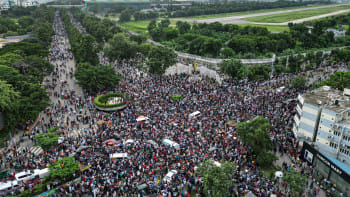Proposition for a national youth parliament

In July and August, Bangladesh witnessed an incredible demonstration of grit and determination from its youth. Historically, the youth have always been at the forefront of major movements in Bangladesh, such as the Language Movement of 1952. Earlier this month, the youth of this fairly young nation once again changed its course by leading a massive movement against the discrimination in government jobs, which ultimately resulted in the resignation of the former prime minister.
It is now crucial to incorporate the voices of the youth in the country's decision-making processes. Bangladesh can achieve this by establishing its own youth parliament, which would serve as a meaningful policy-making platform solely led by the youth, for the youth.
Bangladesh is experiencing a rise in its youth population. As of 2023, youths account for 28 percent of the country's population. These young people face numerous challenges, including unemployment, poverty, administrative and regulatory barriers to accessing financial services, and difficulties in obtaining quality education. Young people in underdeveloped and climate-vulnerable regions are the worst victims of the prevailing socio-economic and environmental problems.
To capitalise on the demographic dividend, it is essential to address the problems faced by young people; otherwise, these issues will become problems for the entire country. Policymakers must actively engage with the youth, listen to their concerns sincerely, and establishing a youth parliament is the most systematic way to do so.
On a global scale, date from the Inter Parliamentary Union shows that half the world's population is under 30, yet only 1.74 percent of MPs in South Asia represent this age group. The former National Parliament of Bangladesh did not have any MPs under the age of 30. So, who could have represented the concerns of the youth in the nation's most important legislative body?
In the Asia-Pacific region, many countries have established government-facilitated institutions to enable youth civic engagement in political and decision-making processes. Sri Lanka, Malaysia, and Nepal have strong national youth councils. Vietnam and the Philippines have youth councils that also serve as policy-making bodies to the government. Bhutan's National Youth Assembly includes Women, Children, and Youth Standing Committees, while India and Pakistan have temporary National Youth Parliament schemes that provide short-term platforms for debate on timely issues.
These youth structures typically engage in activities such as dialogues, debates, and training on topics like entrepreneurship, innovation, and skill development.
Bangladesh has a Standing Committee in Parliament on the Ministry of Youth and Sports, but the actual presence of youth in this committee has been lacking. We also have a National Youth Council. However, this government-affiliated council has been perceived as inactive and largely absent on youth issues. Additionally, there are a few mock Youth Parliaments organised by social development agencies to enable short-term discussions. However, the policy recommendations from these forums rarely reach decision-makers. The political system needs to be revisited and restructured to accommodate a youth parliament that can serve as a policy-making body on major issues.
Establishing a youth parliament in Bangladesh has always been complex and fraught with technicalities. The current situation presents an opportune moment to establish a national youth parliament as a testament to the power of Bangladeshi youth. A well-structured youth parliament can transform the mindset of the country's young people by equipping them with the knowledge and experience of parliamentary processes. Such a parliament can bridge generations by encouraging veteran leaders to collaborate with the new generation, ensuring that leadership wisdom is passed on
If a youth parliament is successfully established, it must ensure diversity and inclusivity in participation, sustainability and transparency in the engagement process, and authenticity in its operations. If the country's politicians are unwilling to pass the baton to new faces, the nation will face periodic setbacks in its development journey.
Nishat Farzana recently worked on Youth Political Participation issues in the Asia Pacific as a UN Volunteer Specialist with UNDP.
Views expressed in this article are the author's own.
Follow The Daily Star Opinion on Facebook for the latest opinions, commentaries and analyses by experts and professionals. To contribute your article or letter to The Daily Star Opinion, see our guidelines for submission.

 For all latest news, follow The Daily Star's Google News channel.
For all latest news, follow The Daily Star's Google News channel. 








Comments